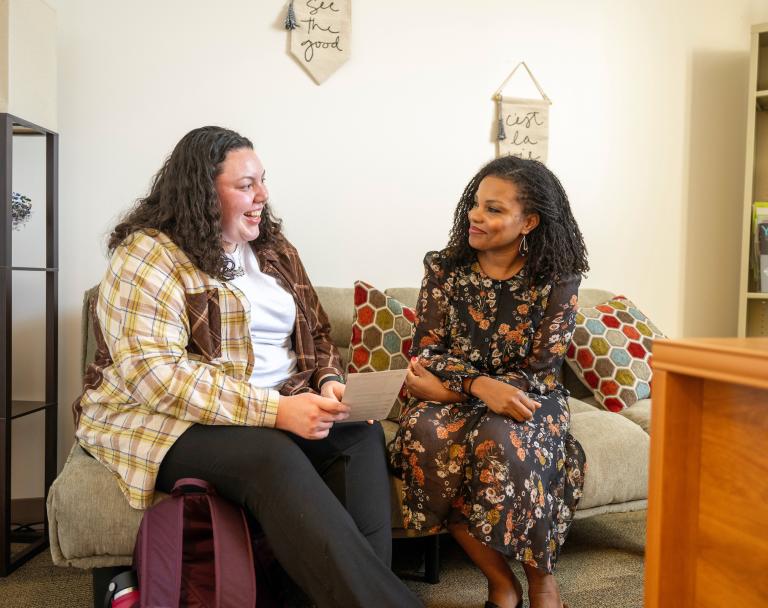
Many students experience the urge to quit college at one time or another. Through the Spartan Success Network and an array of data-driven, student-focused initiatives, York College of Pennsylvania strives to help students overcome that temptation and complete their degree.
Gabrielle Sladek ’26 (Aston, PA) had dreamed of becoming a nurse since high school. But as she began her second semester at York College of Pennsylvania, she felt as if life was spinning out of control. She was struggling with a Biology class, and she was in a dark place mentally and emotionally.
She was ready to drop out.
Gabrielle shared what she was going through with her academic advisor. In weekly meetings, she was honest about her personal and academic struggles. Together they mapped out a plan, walking through what each week would look like and how to get through each day.
“She made me feel like I wasn’t alone, and that it definitely gets better,” Gabrielle says.
The long-term payoff
Her advisor knew that if Gabrielle stayed in college, the benefits would far outweigh the temporary difficulties. In fact, completing a college degree yields numerous returns, ranging from enhanced career prospects to increased earnings potential.
According to the U.S. Bureau of Labor Statistics, individuals with a bachelor’s degree experience lower unemployment rates and higher median weekly earnings compared with those holding only a high school diploma. In 2020, the median weekly income for someone with a bachelor’s degree was $1,248, while for those with only a high school diploma it was $746. College graduates also tend to have access to a wider range of job opportunities and are more likely to receive employer-provided benefits such as health insurance and retirement plans.
To top it off, a college degree is associated with improved job satisfaction and opportunities for career advancement. Investing in higher education not only enriches individuals intellectually but opens doors to a more secure and fulfilling professional future.
Those are facts that Omar Castro ’25, an Accounting major from York, knows firsthand. Omar’s family moved to the United States from the Dominican Republic while he was in middle school.
“My family made a big sacrifice coming to this country, and education is really important to them,” he says. “I didn’t want to disappoint my family and myself.”
Still, during his first semester, Omar became set on dropping out. He had completed high school during the COVID-19 pandemic and had appreciated the flexibility of attending school from home. With in-person classes resuming at York College, that option was no longer available. He could save time and make more money living at home and getting a job, he thought.
He turned to a good friend and mentor who had earned his master’s degree at York College. They talked about life goals and plans for the future. Omar shared that he hopes to start a real estate and financial advising firm.
The friend asked Omar how he planned to help people become financially literate and purchase homes without having the knowledge and resources that the friend had gained through his degree program. Conversations with his mentor, as well as his academic advisor and York College Community Opportunity Scholarship Program (YCCOSP) advisor, confirmed his friend’s words.
“They helped me see opportunities available with a degree,” Omar says.
Barriers to success
Numerous barriers can impede students’ progress toward completing a college degree. Financial constraints represent a significant hurdle, as the rising costs of tuition, textbooks, and living expenses can strain budgets.
Balancing work and academic responsibilities is another challenge, with many students juggling part- or full-time jobs to cover expenses. Family obligations such as caregiving or a lack of familial support can also disrupt academic pursuits. Inadequate access to or use of academic resources, such as tutoring and counseling services, can hinder students’ ability to overcome academic challenges.
“Let’s be clear, there are 100 reasons a student might not return,” says Joshua Landau, Ph.D., Associate Provost for Student Success at York College. “But we have resources on campus to help students be capable of returning.”
York College is addressing these barriers through a holistic approach, combining financial aid initiatives and comprehensive support services to ensure that all students have the opportunity to complete their degrees.
A circular technique
Through more than 25 years at York College, first as a professor of Psychology and now as head of the Student Success Division, Dr. Landau has used data to help promote student retention and success. He takes a circular, rather than linear, approach to helping the multidimensional students who call York College home.
When Dr. Landau transitioned to the Student Success Division in 2016, his goal was to remove obstacles that impede students’ path to a successful education. The Division oversees Academic Advising, the Academic Success Center, the Writing and Communication Studio, and Student Accessibility Services. It also manages the York County-based scholarship programs York Promise and YCCOSP. Dr. Landau also recently took over the First-Year Experience.
He also revived the Retention Committee, comprised of faculty, staff, and student representatives who focus on smoothing a student’s path to graduation.
“One of the issues we identified early on was we needed to enhance the communication about our students,” Dr. Landau says.
Cindell Behrmann ’24, a Political Science major and Urban Education minor, served as a student voice on the Committee. That involvement helped Cindell see how the College was assisting students from vulnerable backgrounds to succeed.
“When they were discussing their action steps focused on areas of vulnerability, one that stood out to me was recognizing student achievements and celebrating their successes,” Cindell says. “I feel like there were many students doing amazing things without recognition.”
Cindell worked with the College to find ways to better recognize students and communicate award opportunities.
Spartan Success Network
A byproduct of the Retention Committee’s work was the implementation in 2017 of a software called Starfish, branded as Spartan Success Network (SSN), which provides a single touchpoint for faculty and staff to communicate with one another and students about student concerns and successes.
“We were very purposeful and strategic about the rollout of it,” says Renée Sefton, Coordinator of Student Success Initiatives.
Through the SSN, faculty can send students kudos as positive reinforcement for a job well done. That is one of four communication tools available. Flags are the flip side of that praise, raising concerns about well-being, class performance, work not completed, or classes missed. The software keeps everyone, from students to professors to athletic coaches to advisors, on the same page and helps pinpoint early risk factors for dropping out.
Referrals, the third communication tool, direct a student to connect with a specific resource on campus, while to-dos, the final tool, direct a student to complete an important task. Various York College staff members use this data to look for behavior patterns and connect with students who are struggling.
“If they start to see flags across multiple classes or a bunch in one course, folks pay attention to that,” Sefton says.
For Omar and Gabrielle, kudos were an encouragement to keep going when they couldn’t see a way forward. The SSN also offers the opportunity to connect with resources. A degree planner helps students stay on their academic paths, while resources for various clubs, scholarships, and programs keep students informed about opportunities.
An advisor model for success
Another key to retaining students has been York College’s faculty advisor program. While larger institutions might have an advising office, York College connects every full-time student with a faculty advisor. These individuals not only advise but discuss students’ plans and a route to achieve them.
“It’s more of a mentoring role,” Dr. Landau says. “Our faculty not only talk about what’s necessary to graduate on time but also talk about what students want to do after York College.”
Many students point to that one-on-one interaction with faculty as a highlight of their time at York College. It’s not just specific career advice that makes these interactions so valuable but the advisors’ compassion and dedication of time.
Warning signs
Through researching the data generated by the Spartan Success Network, Dr. Landau and his team discovered an interesting trend. Students who withdraw from even a single class in their first year were less likely to continue into their second year. The ripple effects of withdrawing from one course could have enormous consequences. Students might lose financial aid, lengthen their path to graduation, or lose NCAA eligibility.
“One of the things we developed was a process where a student ‘raises a hand’ via SSN if they want to withdraw,” says Sefton. “Their instructor, advisor, and coach are notified, and each one is asked to contribute information from their perspective.”
The goal is to use a combination of data and personal interaction to help students make a well-informed decision rather than take dire action in a moment of feeling frustrated or overwhelmed.
When the only option seems to be dropping out
For Gabrielle, when her Biology grade began slipping, withdrawing from the class and possibly from the College appeared to be her only choice.
“Sometimes, the weight of something like that is so heavy that the only option feels like dropping out,” she says.
But before taking that step, Gabrielle turned to the support structure around her. She talked with her parents, who helped her look to the future and consider her career options. She worked with her faculty advisor and academic advisor to make a plan. She spoke with her roommates, both of whom had switched their majors from Nursing to Human Services.
After taking time to weigh her options, Gabrielle chose to change her major to Human Services rather than leave school. She still would be in a career field where she helped people, which was important to her, but she’d be focused on subjects that weren’t as daunting. Finding the right people to seek out and ask for support was key.
Dr. Landau and his team continually look for data markers that indicate a student will or won’t be successful. If a student is having academic trouble or missing classes, the Student Success Division engages and puts the student in touch with the resources that can help, whether that’s a faculty advisor, the Counseling Center, or the Writing Center.
“The key is in-person interaction,” Dr. Landau says. “As a campus, we do our best to work in those one-on-one conversations.”
Back on Track
For those still struggling, York College has implemented the Back on Track program, an Academic Advising Center initiative to assist students who are on academic probation with a cumulative GPA below 2.0. This program pairs students with mentors in one-on-one sessions to assess the students’ unique strengths, challenges, needs, and motivations in the context of academic success. Together, mentor and student develop a personalized academic plan to address factors that impact academic performance and enhance necessary skills, habits, and strategies. The mentor provides ongoing support and guidance to monitor a student’s progress and build momentum toward academic goals.
Students going through the program have increased their cumulative GPA, which helps academic standing and financial aid eligibility. The program encourages students to advocate for their success with the mentor’s feedback, knowledge, guidance, and tools, fostering a foundation for continual growth.
Sefton, who coordinates the program and serves as a mentor, has seen a major impact on students. The most positive feedback focuses not only on the academic help they receive but the opportunities for one-on-one interaction with a mentor.
“When we ask them what was the most helpful aspect of the mentorship, they usually say the general advice they received, the general kindness and rapport they have with their mentor,” Sefton says.
While the program is driven by data, it’s the personalized approach to retaining students and helping them to succeed that has worked.
Education accessible to all
Academic issues aren’t the only needs addressed by the Student Success Division. Many students have accessibility problems. York College aims to engage each student and provide a path to success. Often, though, students are wary to tap into that help.
Students who had an Individualized Education Plan in high school are eligible for special accommodations in college, which both showcase their strengths and help them with their struggles. But often students refuse those accommodations. For Dr. Landau, this is vexing.
“We as a country have carved out a way for you to show how smart you are, and you don’t want to take advantage of that. That is one of the more frustrating things for me,” he says. “We have hundreds of students that use that resource. We have to make sure we’re meeting you where you are.”
Gabrielle, who has such accommodations, discovered a vast amount of support when she tapped into the resources of not only the Accessibility Center but the Counseling Center and Writing Center.
“I try to use all my resources,” she says. “If I am failing, I can go to them as a backbone.”
The future looks bright
While York College has expanded its research and implementation of student retention initiatives, there’s still more to do. Dr. Landau and his team are strengthening and growing the First-Year Experience to help students be more successful and avoid common pitfalls that can lead to dropping out.
He also is working to increase opportunities for students to work on campus. He is focusing on changing the pay scale for those jobs and synchronizing certain aspects of training across the campus. He hopes that the data his team has gleaned will continue to support a campus where all students can be successful.
For Gabrielle, that success has looked like diving headlong into her new Human Services major and seeking the support she needs to make each day a success. She loves the switch and the fact that she is pursuing a career where she’ll be able to help people in a way that better fits her skill set.
For Omar, sticking it out through that first, difficult semester has paid off. He’s on track to complete his master’s degree in one of York College’s 4+1 degree programs. The connections he’s made have led to job and internship opportunities.
“Don’t give up,” he says. “The way employers see a college degree shows that you’re capable of taking on a challenge and finishing it.”
Cindell’s final undergraduate semester is being spent in Washington, D.C., serving as an intern for Rep. Cori Bush of Missouri. Then it’s back to York College for Master of Public Policy and Administration studies in the 4+1 degree program.
“York College is here to help you and work with you,” Cindell says. “You’re not just a number, you’re a human being. You’re not alone in this.”
Keys to Success
By tracking the data, the Student Success Division has pinpointed several key efforts that help students to thrive:
- Go to class: If a student doesn’t want to go to class or is skipping classes, it is an early warning sign that something is going wrong.
- Be engaged: Whether it’s a mentorship, a sports team, a club, an organization, or an affiliation with a professor, successful students engage with people on campus.
- Stay healthy: Maintaining physical, mental, and emotional health is important to academic success.
- Get financial support: The College has numerous scholarships and financial aid opportunities for students. Getting an on-campus job can be a key factor in student success.
- Find a buddy: When Dr. Landau taught Psychology, he encouraged his students on the first day of class to find a buddy. Jump in, find your group, be a good friend, and support each other.
- Reach out and get help: Don’t be afraid to start the conversation and advocate for yourself. Often a struggle has multiple layers. Students might have a difficult time knowing to whom to turn. Through the SSN, students can connect with various parties and collaborate on solutions.
- Realize it’s okay to be undecided: Parents should allow students to follow what they deem to be their path. If they are undecided, that’s all right. York College students are given time to explore and discover their interests. If students aren’t thriving in their degree program, parents should encourage them to consider other options before dropping out.
- Use your resources: The College offers numerous types of support for students. Don’t wait until you’re struggling to access them. The advisor program, the Counseling Center, the Writing Center, and Accessibility Services were created to help you thrive.
Learn More | Student Success at York College of PA



